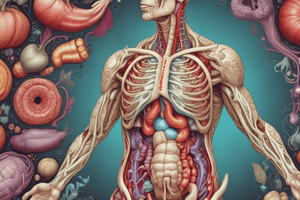Podcast
Questions and Answers
What is the primary focus of Evidence-Based Practice (EBP) in nursing?
What is the primary focus of Evidence-Based Practice (EBP) in nursing?
- Integration of clinical expertise, patient values, and best research evidence (correct)
- Following established protocols without modification
- Assuming that past practices guarantee future success
- Relying solely on patient preferences above all else
Which nursing theory emphasizes the importance of the patient's environment?
Which nursing theory emphasizes the importance of the patient's environment?
- Florence Nightingale's Environmental Theory (correct)
- Jean Watson's Theory of Human Caring
- Dorothea Orem's Self-Care Theory
- Patricia Benner's Novice to Expert Theory
What does holistic care in nursing aim to address?
What does holistic care in nursing aim to address?
- The social and financial status of the patient
- The patient as a whole, including emotional and spiritual needs (correct)
- Grouping patients based solely on clinical diagnosis
- Only the physical health of the patient
Which of the following is NOT considered a core competency in nursing?
Which of the following is NOT considered a core competency in nursing?
What is the main goal of nursing research?
What is the main goal of nursing research?
Which ethical principle ensures that a patient's rights are respected in nursing?
Which ethical principle ensures that a patient's rights are respected in nursing?
Why is interdisciplinary collaboration important in nursing?
Why is interdisciplinary collaboration important in nursing?
What is a key aspect of global health that nursing professionals should be aware of?
What is a key aspect of global health that nursing professionals should be aware of?
Flashcards are hidden until you start studying
Study Notes
Overview of Nursing Science
- Definition: Nursing science is the study of the principles, practices, and theories that inform nursing as a profession.
- Scope: Encompasses a variety of disciplines including biology, psychology, sociology, ethics, and medicine.
Key Concepts
-
Evidence-Based Practice (EBP):
- Integration of clinical expertise, patient values, and the best research evidence.
- Promotes improved patient outcomes and care quality.
-
Nursing Theories:
- Frameworks that guide nursing practice and research.
- Examples:
- Florence Nightingale's Environmental Theory.
- Jean Watson's Theory of Human Caring.
-
Holistic Care:
- Focus on treating the patient as a whole, considering physical, emotional, social, and spiritual needs.
-
Patient-Centered Care:
- Emphasizes respect for and responsiveness to individual patient preferences, needs, and values.
Core Competencies
- Clinical Skills: Proficiency in assessments, interventions, and evaluations of patient care.
- Communication: Effective interaction with patients, families, and healthcare teams.
- Critical Thinking: Analytical skills to solve problems and make decisions in patient care.
- Leadership: Ability to guide teams and manage patient care effectively.
Research and Innovation
- Nursing Research: Systematic investigation to develop knowledge for the profession.
- Focus areas include:
- Health promotion.
- Disease prevention.
- Quality of care.
Professional Development
- Importance of lifelong learning, continuing education, and obtaining advanced degrees or certifications.
Ethical and Legal Aspects
- Understanding nursing ethics and legal responsibilities is essential.
- Key ethical principles include:
- Autonomy.
- Beneficence.
- Non-maleficence.
- Justice.
Interdisciplinary Collaboration
- Cooperation with other health professionals to optimize patient care and healthcare delivery.
Global Health
- Awareness of global health issues and the role of nursing in addressing disparities in healthcare access and quality.
Nursing Science: Overview
- Nursing science encompasses various disciplines, including biology, psychology, sociology, ethics, and medicine.
- It focuses on understanding and applying principles to enhance nursing practice.
Evidence-Based Practice (EBP)
- Integrates clinical expertise, patient values, and the best research evidence into nursing practice.
- Promotes better patient outcomes and care quality.
Nursing Theories
- Frameworks that guide nursing practice and research, offering perspectives on patient care.
- Examples include Florence Nightingale's Environmental Theory and Jean Watson's Theory of Human Caring.
Holistic Care
- Focuses on treating the patient as a whole, considering their physical, emotional, social, and spiritual needs.
Patient-Centered Care
- Emphasizes respect for and responsiveness to individual patient preferences, needs, and values.
Core Competencies
- Clinical Skills: Proficiency in assessments, interventions, and evaluations of patient care.
- Communication: Effective interaction with patients, families, and healthcare teams.
- Critical Thinking: Analytical skills to solve problems and make decisions in patient care.
- Leadership: Ability to guide teams and manage patient care effectively.
Research and Innovation
- Nursing research investigates various health-related topics to advance the profession.
- Focus areas include health promotion, disease prevention, and quality of care.
Professional Development
- Continuous learning, including continuing education, advanced degrees, and certifications are crucial for professional growth.
Ethical and Legal Aspects
- Understanding ethical principles and legal responsibilities is essential for nurses.
- Key ethical principles include autonomy, beneficence, non-maleficence, and justice.
Interdisciplinary Collaboration
- Collaboration with other health professionals is crucial for optimal patient care and healthcare delivery.
Global Health
- Awareness of global health issues and the role of nursing in addressing disparities in healthcare access and quality is essential.
Studying That Suits You
Use AI to generate personalized quizzes and flashcards to suit your learning preferences.




